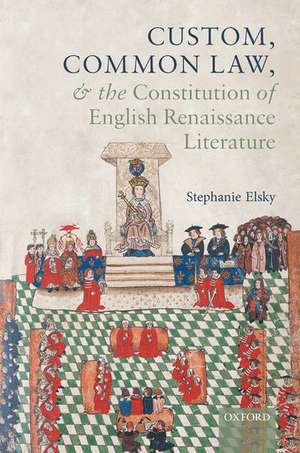Custom, Common Law, and the Constitution of English Renaissance Literature: Law and Literature
Autor Stephanie Elskyen Limba Engleză Hardback – 24 sep 2020
Preț: 474.09 lei
Preț vechi: 612.69 lei
-23% Nou
Puncte Express: 711
Preț estimativ în valută:
90.72€ • 95.03$ • 75.18£
90.72€ • 95.03$ • 75.18£
Carte tipărită la comandă
Livrare economică 29 martie-04 aprilie
Preluare comenzi: 021 569.72.76
Specificații
ISBN-13: 9780198861430
ISBN-10: 0198861435
Pagini: 240
Dimensiuni: 165 x 242 x 20 mm
Greutate: 0.52 kg
Editura: OUP OXFORD
Colecția OUP Oxford
Seria Law and Literature
Locul publicării:Oxford, United Kingdom
ISBN-10: 0198861435
Pagini: 240
Dimensiuni: 165 x 242 x 20 mm
Greutate: 0.52 kg
Editura: OUP OXFORD
Colecția OUP Oxford
Seria Law and Literature
Locul publicării:Oxford, United Kingdom
Recenzii
In Custom, Common Law, and the Constitution of English Renaissance Literature, Stephanie Elsky extends methodologies for the study of English literature rooted in new historicism from the late 1970s to the early 1990s. Elsky theorizes "custom" as a matter of cultural and political discourse relevant for sixteenth-century English literature in relation to proverbial language, common law, constitutionalism, and ideas of temporality.
This stunning and substantial book combines historical study, literary analysis, and theoretical reflection. … Throughout the book, Elsky nimbly handles custom's immemorial resistance to the impulse to periodize, making the work we do as scholars of the sixteenth and seventeenth centuries a little more challenging-and a lot more interesting.
In Custom, Common Law, and the Constitution of English Renaissance Literature, Stephanie Elsky offers a prescient study of historical continuity, one that challenges notions of epistemic change, periodization, and even historical consciousness ... Grounding her study in an extensive excavation of the uses of custom, Elsky illuminates the surprising range of possibility -- specifically literary possibility -- within this familiar concept.
[Elsky's] book offers a new, compelling and optimistic framework for reading English literature's conceptual debt to law in the early modern period, as well as for thinking about its legacy for our own times.
Custom, Law, and the Constitution of English Renaissance Literature provides the most wide-ranging account to date of the conceptual machinery of custom and custom's key place in the legal imaginary of the period. The book distinguishes itself by showing not simply how legal culture was reflected, commented on, or critiqued by plays and poems, but rather how law generated habits of thought that shaped both formal and material components of writing and reading literature. This sort of critical nuance aligns Elsky's book with the very best work being done on literature and law. It will be required reading for anyone interested in the intersections of literary and legal culture in the early modern period.
This sophisticated book is a fascinating combination of legal history, political thought and literary analysis, illuminating a central aspect of how precisely a modern 'historical consciousness' was born in Renaissance England.
This stunning and substantial book combines historical study, literary analysis, and theoretical reflection. … Throughout the book, Elsky nimbly handles custom's immemorial resistance to the impulse to periodize, making the work we do as scholars of the sixteenth and seventeenth centuries a little more challenging-and a lot more interesting.
In Custom, Common Law, and the Constitution of English Renaissance Literature, Stephanie Elsky offers a prescient study of historical continuity, one that challenges notions of epistemic change, periodization, and even historical consciousness ... Grounding her study in an extensive excavation of the uses of custom, Elsky illuminates the surprising range of possibility -- specifically literary possibility -- within this familiar concept.
[Elsky's] book offers a new, compelling and optimistic framework for reading English literature's conceptual debt to law in the early modern period, as well as for thinking about its legacy for our own times.
Custom, Law, and the Constitution of English Renaissance Literature provides the most wide-ranging account to date of the conceptual machinery of custom and custom's key place in the legal imaginary of the period. The book distinguishes itself by showing not simply how legal culture was reflected, commented on, or critiqued by plays and poems, but rather how law generated habits of thought that shaped both formal and material components of writing and reading literature. This sort of critical nuance aligns Elsky's book with the very best work being done on literature and law. It will be required reading for anyone interested in the intersections of literary and legal culture in the early modern period.
This sophisticated book is a fascinating combination of legal history, political thought and literary analysis, illuminating a central aspect of how precisely a modern 'historical consciousness' was born in Renaissance England.
Notă biografică
Stephanie Elsky is Assistant Professor of English at Rhodes College. Her areas of research and teaching include law, politics, and literature; the reception of the classical past; gender; women's writing; and the global Renaissance. She has published essays in English Renaissance Literature, Law Culture and the Humanities, and Spenser Studies, and won the Louis Wilson Round Award for Best Essay in Studies in Philology in 2014. Her research has been supported by the American Council of Learned Societies, the Andrew W. Mellon Foundation, and the Volkswagen Foundation.










